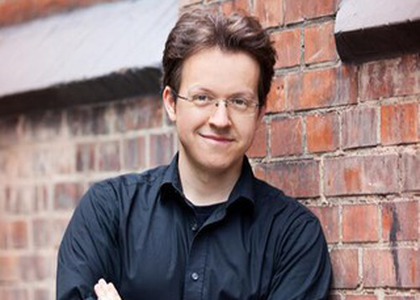> Interviews

Interview with pianist Andrei Banciu
Andrei Banciu, on January 13th, 2025, you will give a recital alongside violist Tabea Zimmermann. The recital at Wigmore Hall will be broadcast live on Radio România Muzical. How would you describe your professional relationship with Tabea Zimmermann?
I met Tabea Zimmermann when I started my teaching activity at the "Hanns Eisler" Academy of Music in Berlin. She was leading a viola class there, and I began working with her students. From the very beginning, it was a great joy for me to assist and be directly involved in collaboration with her. This activity further developed into our musical collaboration, performing concerts together, with me accompanying her in some of her masterclasses. Most recently, in June 2024, I performed with her at a festival in Italy; a few years ago, we also performed in Spain. Our next project, as you mentioned, is the recital at Wigmore Hall on January 13th, 2025.
In 2019, you gave a recital at the Radio Hall as part of the "Heirs of Musical Romania" project, together with violinist Ioana Cristina Goicea. How do you remember that experience, and what do you think is the importance of such a project?
I remember this project with great pleasure! It was just before the pandemic, a period that marked an important break for many people. Yes, it was a great joy to participate in this project, and in general, I found this initiative very commendable. I'm glad to hear that, as I've found out, this project continues with many other young Romanian performers.
In our case, we performed this concert, which was later recorded and released on disc. It was a great joy to perform together on the stage of the Radio Hall!
Returning to the recital on January 13th, could you tell us how you chose the program?
You may have noticed that the program includes music by two Romanian composers. Among other pieces, we will perform Concert Piece for Viola and Piano by Enescu, which is a cornerstone of the repertoire for these two instruments. We will also perform Arioso et Allegro Appassionato by Stan Golestan, a composer unfortunately less known even in Romania, but one who left some works of great value.
Incidentally, in recent years I have been quite involved in researching Stan Golestan's works, as I consider him a fascinating personality. He was a contemporary of Enescu; they were colleagues, if not friends, in Paris.
With Ioana Cristina Goicea, I actually recorded the Sonata for Violin and Piano by Stan Golestan a few years ago in a world premiere. This piece was composed in 1908, and Enescu himself premiered it in the same year. After that, it seems the work was not performed again-or at least, I couldn't find evidence of it. We managed to record it, and I think that was very important because it is a work of great value.
The piece I will perform with Tabea Zimmermann is, however, quite well-known among violists and is frequently played, at least in Romania. In fact, it was my idea, which I proposed to Tabea Zimmermann, to include this piece in the program, and she was very open to it.
Through this concert, we are also, in a way, inaugurating the "jubilee" of Stan Golestan's birth, as 2025 marks 150 years since his birth (1875).
Around these two pieces, we've grouped other compositions that, in one way or another, are connected to George Enescu-namely, works or composers who deeply inspired Enescu. Specifically, we will perform Brahms' Scherzo. It is well-known that Brahms was an idol for Enescu, who even recounted that, as a child performing in the Vienna Conservatory Orchestra, he met Brahms. Brahms would attend the orchestra rehearsals, offer advice, and Enescu had direct contact with him. Additionally, we will play pieces by Robert Fuchs, a composer whose works are not very well-known today. However, Robert Fuchs was one of Enescu's teachers in Vienna. Alongside these composers-Enescu, Golestan, Brahms, and Fuchs-we will also perform one of Joseph Joachim's Jewish Melodies and the three wonderful romances by Clara Schumann.
Translated by Sorana Andreea Dumitrescu,
University of Bucharest, Faculty of Foreign Languages and Literatures, MTTLC, year I
Corrected by Silvia Petrescu














